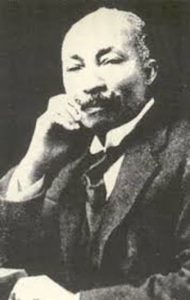
Joseph Hayford
*Joseph Hayford was born on this date in 1866. Also known as Ekra-Agiman, he was a Black African journalist, editor, author, lawyer, educator, and politician who supported pan-African nationalism.
Joseph Ephraim Casely Hayford was born in Cape Coast, in the British Gold Coast colony, now Ghana. His family, part of the Fante Anona clan and descendants of a dynasty of Omanhenes and Okyeames, was part of the prominent coastal elite and had European ancestry. His father, Joseph de Graft Hayford, was educated and ordained as a Methodist church minister and a prominent figure in Ghanaian politics. His mother was from the Brew family, descended from the 18th-century European trader Richard Brew and his African concubine. Brew settled in this area around 1745. Casely was one of Joseph's middle names; he adopted Casely Hayford as a non-hyphenated double surname. His brothers were Ernest James Hayford, a doctor, and the Reverend Mark Hayford, a minister.
Casely Hayford attended Wesley Boys' High School (now known as Mfantsipim) in Cape Coast and Fourah Bay College in Freetown, Sierra Leone. While in Freetown, Casely Hayford became an avid follower of Edward Wilmot Blyden, the foremost pan-African figure at the time, who edited Negro, the first explicitly pan-African journal in West Africa. Upon returning to Ghana, Casely Hayford became a high school teacher. He eventually was promoted to principal at Accra Wesleyan Boys' High School. He was dismissed from his position at the school for his political activism. In 1885, he began working as a journalist for the Western Echo, which his maternal uncle James Hutton Brew owned.
By 1888, Casely Hayford was the editor, and he renamed the paper the Gold Coast Echo. From 1890 to 1896, he was co-proprietor of the Gold Coast Chronicle. He also wrote articles for the Wesleyan Methodist Times. 1893 Casely Hayford traveled to London to study as a barrister at the Honorable Society of the Inner Temple and Peterhouse, Cambridge. Casely Hayford met Adelaide Smith, a lady of Sierra Leonean Creole origins during that time. They later married, and she returned with him to the Gold Coast in 1896 after he was received by the bar on November 17, 1896. That year in Ghana, he went into private law practice in Cape Coast, Axim, Sekondi, and Accra. He also continued his journalism work, editing the Gold Coast Leader.
In 1904, he helped found the Mfantsipim School. In 1910, he succeeded John Mensah Sarbah as president of the Aborigines Rights Protection Society, the first anti-colonial organization founded on the Gold Coast. Casely Hayford wrote several books, primarily as commentary and opposition to land management acts issued by the colonial government, such as the Crown Lands Bill of 1897 and the Forest Ordinance of 1911. He believed African identity and social stability were inextricably linked to conserving existing land rights conventions. While visiting London to protest the Forest Ordinance of 1911, he was part of a group that gave financial assistance to Dusé Mohamed Ali to get his African Times and Orient Review off the ground. Others were Francis T. Dove and C. W. Betts from Sierra Leone and Dr. Oguntola Sapara from Lagos.
He published a novel entitled Ethiopia Unbound (1911), which is one of the first novels in English by an African. It has been cited as the earliest pan-African fiction. The novel is set in both Africa and England. It relies on philosophical debates between an African and his English friend. It references contemporary African events and ancient African history to provide a context for its exploration of African identity and the struggle for emancipation. Casely Hayford was the progenitor of the Casely-Hayford family of Ghana and Britain. His descendants have served as part of the latter country's Black British elite. Casely Hayford was also deeply involved in the political movement for African emancipation.
He participated in Booker T. Washington's International Conference on the Negro in 1912, and his correspondence with Washington fostered the pan-African movement in Africa and the United States. Casely, Hayford's career in public office began with his nomination to the Legislative Council of the Gold Coast in 1916. As a legislator, he served on various public commissions and received an MBE in the 1919 Birthday Honors for services in aid of the Prince of Wales's Patriotic Fund. In the same year, he formed West Africa's first nationalist movement, the National Congress of British West Africa, one of the earliest formal organizations working toward African emancipation from colonial rule.
He represented the Congress in London in 1920 to demand constitutional reforms from the colonial secretary and address the League of Nations Union. He was criticized for accepting inadequate concessions from the colonial authorities. While promoting an African nationalism that demanded unity and cultural awareness among Africans, Hayford advocated only constitutional political reforms within the framework of Ghana remaining a colony. He became the first patron of the West African Students' Union in 1925 and was elected as a municipal member for Sekondi in September 1927.
Joseph Hayford's death on August 11, 1930, and the National Congress was dissolved shortly after. He was first married to Beatrice Madeline Pinnock. Their son Archie Casely-Hayford became a barrister, district magistrate, and the first Minister of Agriculture and Natural Resources in the First Republic of Ghana. Adelaide and Joseph had a daughter, Gladys May Casely-Hayford, who was a teacher, an artist, and a poet. Some of her poems were published under the pen name of Aquah Laluah.